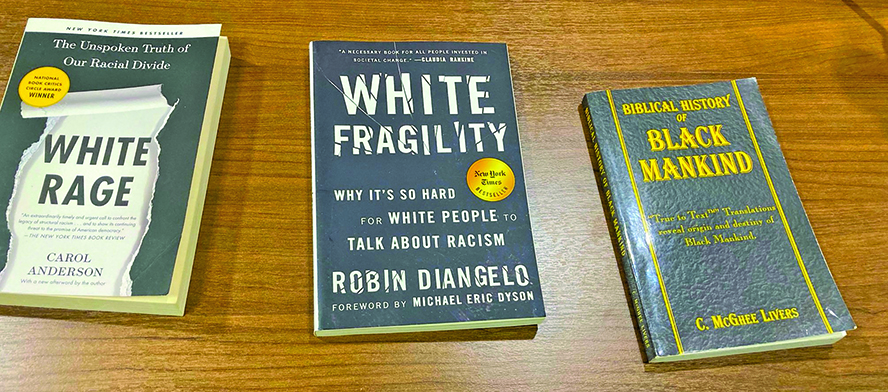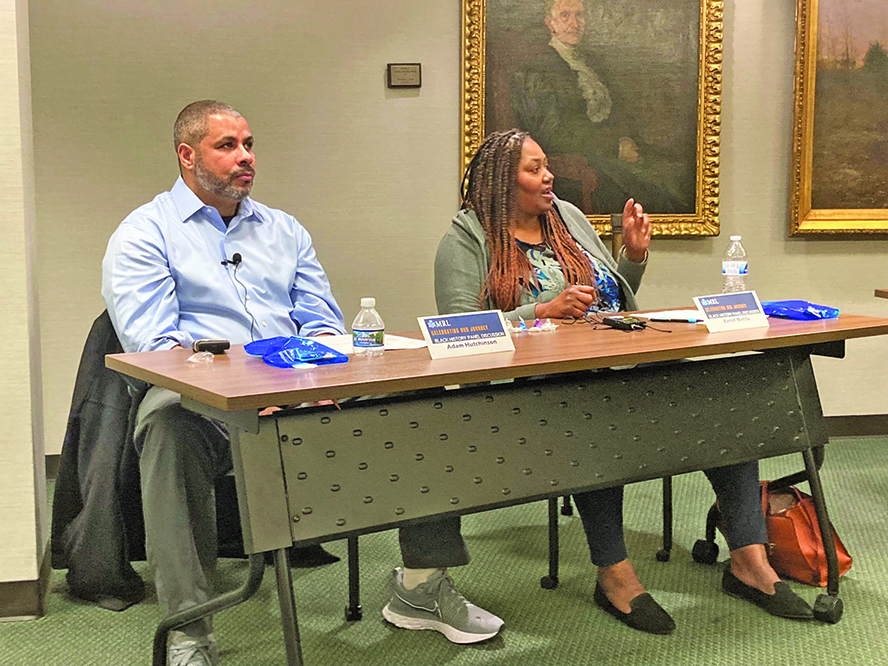Black History Month event highlights frustrations, fears of inequality
Five Richmond residents — two lifelong residents and three relative newcomers — talked about their personal experiences with racism during a Black history panel discussion on Feb. 28.
All said Black people — as well as members of other minority groups — are treated as less than equal with white people in Richmond. Some said their view of racism has changed in the past dozen years, stemming from the Trayvon Martin killing in 2012 and events since then.
Led by radio personality and former Richmond Common Council member Kelley Cruse-Nicholson, the panel included Keon Jackson, director of the City of Richmond Housing Authority; Adam Hutchinson, Earlham College athletic director; and Karen Matitu and Yvonne Washington, community members.
The panel held forth for an hour at Morrisson-Reeves Library in Richmond in an activity called “Celebrating Our Journey” and meant to mark Black History Month.
Hutchinson came to Richmond two years ago from New Jersey. He defined racism as “a system set up to determine who gets what” and said it must be addressed both in politics and practices. Politics, he said, is what people say they are going to do; practices are what they actually do.
Later, he added that “we live in a deeply hierarchical society with whites at the top.”
Matitu said that while many people question “Blackness,” few have questioned the pervasiveness and authority of “whiteness.”
Jackson and Hutchinson both spoke of being able to influence change through their professional positions.
Jackson said he hopes to improve the community by making public housing more livable: clean, healthy and affordable, a quality alternative to housing by landlords who don’t take care of their rental properties.
Hutchinson said he had been a coach for many years but transitioned into an athletic director “because of what’s been happening for the past 11 years. I wanted to make my mark, influence the stories that are told.” He is especially passionate about the people that he hires.
Hutchinson said he previously thought the civil rights movement had become nearly unnecessary.
“I used to tell my little boys that racism is a thing of the past, but Trayvon Martin is the day I stopped that,” Hutchinson said.
Martin, a 17-year-old teen, was shot and killed on Feb. 26, 2012, in Florida by a member of a citizen watch patrol. Martin had gone with his father to Sanford, Florida, to visit a friend. He was shot while walking from a convenience store to an apartment where his father was visiting. Police made no arrest, saying the shooter had been justified by Florida’s “stand your ground” law. That sparked nationwide protests. The shooter was not charged with murder until July 2013. A jury acquitted him.
Hutchinson continued, asking, “But how many Black children have we seen killed in our lifetimes with no accountability?” adding, “We can eat where we want but when someone gets killed, we get thoughts and prayers.”
Others on the panel spoke of profiling. Jackson said that when he wears clothing like what he wore to the discussion — sports coat, collared shirt, trousers and good shoes — people treat him with respect. But if he wears a hooded sweatshirt — a hoodie — and other casual clothing, “I get treated differently. I’m the same person, I don’t get it.”
Hutchinson agreed, but says he takes a different approach. When he is out, he wears professional clothing so that he can get what he wants without questions. He feels like he can relax and dress casually only when he’s home, “where I don’t feel the white gaze.”
Matitu came to Richmond as a college student in the 1990s, moved away and returned about two years ago. She often feels she is not being taken seriously when she speaks because she is Black, drawing on her experiences in transitioning from temporary rental housing to buying a property.
She encouraged listeners to spotlight Black excellence in the community.
Washington, who has run for political office more than once, said she tries to be active in politics in the hope that conditions will improve. She takes hope from Stacey Abrams and others around the country who have made elections more compliant with the will of the people.
“But to see what happens behind the scenes, the treachery, is very disturbing, the violations and disregard of the law,” she said.
Abrams is a Georgia politician who unsuccessfully ran for governor of that state. She successfully campaigned for expansion of voter rights in that state.
Cruse-Nicholson said she felt as though she’d had blinders on racial inequality in her early life, although she remembered seeing the movie “Jaws” from the balcony — the Black section — of a local theater. As an adult, she resolved to not let her children and grandchildren ignore realities.
So, when she got a phone call that her 12-year-old granddaughter had hit a playmate, she went to the scene and found out that a white girl and her granddaughter had been slap-boxing. Someone who heard about it had called Cruse-Nicholson to report that the granddaughter had created a problem. After Cruse-Nicholson found out it was just play and the girls were not upset, she spoke with her granddaughter.
“I told her, you are a Black child. You are perceived already as unruly, violent. I told her she’s a Black child and she’s going to be looked at differently.”
“It’s unfortunate we have to talk that way,” Cruse-Nicholson said.
Related reading
Panelist Yvonne Washington recommended three books about racism during the Feb. 28 “Celebrating Our Journey” discussion at Morrisson-Reeves Library.

“White Rage: The Unspoken Truth of Our Racial Divide” is a 2016 nonfiction book by Emory University professor Carol Anderson. She claims the U.S. has always been a racist country and that white people have worked to undermine Black people’s full participation in democracy since the origin of the U.S.
“White Fragility: Why It’s So Hard for White People to Talk About Racism” by Robin DiAngelo, a sociologist, explores the counterproductive reactions white people have when their assumptions about race are challenged.
“Biblical History of Black Mankind” by C. McGhee Livers. The author, a Greek and Hebrew language scholar, retranslates Scriptures from the original Greek and Hebrew manuscripts of the Old and New Testament concerning the glorious origin and destiny of Black humanity, revealing details that English translations left out.
A version of this article appeared in the March 8 2023 print edition of the Western Wayne News.

